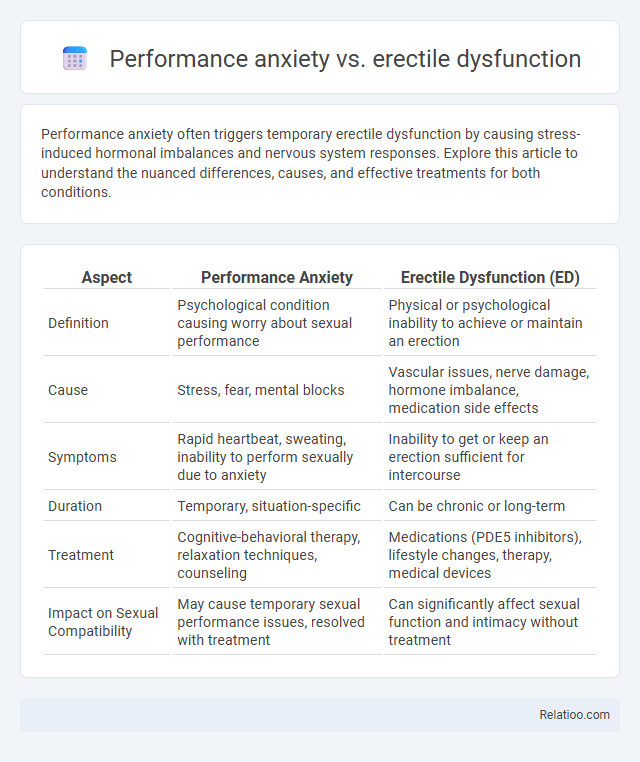Performance anxiety often triggers temporary erectile dysfunction by causing stress-induced hormonal imbalances and nervous system responses. Explore this article to understand the nuanced differences, causes, and effective treatments for both conditions.
Table of Comparison
| Aspect | Performance Anxiety | Erectile Dysfunction (ED) |
|---|---|---|
| Definition | Psychological condition causing worry about sexual performance | Physical or psychological inability to achieve or maintain an erection |
| Cause | Stress, fear, mental blocks | Vascular issues, nerve damage, hormone imbalance, medication side effects |
| Symptoms | Rapid heartbeat, sweating, inability to perform sexually due to anxiety | Inability to get or keep an erection sufficient for intercourse |
| Duration | Temporary, situation-specific | Can be chronic or long-term |
| Treatment | Cognitive-behavioral therapy, relaxation techniques, counseling | Medications (PDE5 inhibitors), lifestyle changes, therapy, medical devices |
| Impact on Sexual Compatibility | May cause temporary sexual performance issues, resolved with treatment | Can significantly affect sexual function and intimacy without treatment |
Understanding Performance Anxiety and Erectile Dysfunction
Performance anxiety is a psychological condition causing temporary sexual dysfunction by triggering stress and fear of failure, whereas erectile dysfunction often involves physical factors like cardiovascular health or diabetes. Understanding performance anxiety helps you recognize that the issue may stem from mental blocks rather than permanent physiological problems, allowing for targeted stress-reduction techniques. Differentiating between these conditions is crucial for effective treatment, as addressing your anxiety can restore confidence and improve sexual performance without unnecessary medical interventions.
Key Differences Between Performance Anxiety and Erectile Dysfunction
Performance anxiety primarily involves psychological factors such as stress and fear of failure, leading to temporary sexual difficulties, while erectile dysfunction (ED) often stems from physical causes like vascular issues, diabetes, or hormonal imbalances that result in persistent inability to achieve or maintain an erection. Performance anxiety typically resolves once the underlying stress is addressed, whereas ED may require medical evaluation and treatment for underlying health conditions. Differentiating between these conditions is crucial for effective treatment, with performance anxiety benefiting from counseling or cognitive-behavioral therapy, and ED often needing medications like PDE5 inhibitors or lifestyle modifications.
Common Causes of Performance Anxiety in Men
Performance anxiety in men often stems from stress, fear of judgment, or past negative sexual experiences, differing from erectile dysfunction, which may have physical causes like cardiovascular issues or hormonal imbalances. Understanding these common causes of performance anxiety helps Your ability to address psychological barriers and improve sexual performance. Recognizing the distinction between psychological performance anxiety and medical erectile dysfunction is crucial for effective treatment and long-term sexual health.
Root Causes of Erectile Dysfunction
Performance anxiety and erectile dysfunction (ED) share overlapping symptoms, but ED primarily stems from physiological root causes such as cardiovascular disease, diabetes, hormonal imbalances, and nerve damage. While your mind and emotions can trigger performance anxiety, underlying physical health issues often drive persistent erectile dysfunction. Addressing these root causes through medical evaluation and lifestyle changes is essential for effective treatment and improved sexual health.
Psychological vs Physical Factors: A Comparison
Performance anxiety primarily involves psychological factors such as stress, fear of failure, and low self-esteem, which inhibit sexual arousal despite normal physical function. Erectile dysfunction often stems from physical conditions, including cardiovascular disease, diabetes, and hormonal imbalances, although psychological factors can also contribute. Differentiating between the two requires assessment of both mental health and physical health to tailor effective treatment strategies targeting the underlying causes.
Symptoms of Performance Anxiety vs Erectile Dysfunction
Performance anxiety primarily causes psychological symptoms such as persistent worry, rapid heartbeat, and difficulty maintaining focus, leading to intermittent erectile difficulties. Erectile dysfunction, however, involves a consistent inability to achieve or maintain an erection due to physical factors like vascular problems or hormonal imbalances. Identifying whether Your symptoms stem from anxiety or an underlying medical condition is essential for effective treatment and improved sexual health.
Impact on Relationships and Emotional Well-being
Performance anxiety and erectile dysfunction both significantly affect relationships and emotional well-being by reducing intimacy and increasing stress. Performance anxiety often triggers a cycle of fear and avoidance that strains communication and trust, while erectile dysfunction can lead to feelings of inadequacy and diminished self-esteem, impacting partner dynamics. Addressing these issues through open dialogue and professional support fosters healthier emotional connections and relationship resilience.
Diagnosis: Identifying the Underlying Issue
Differentiating performance anxiety from erectile dysfunction requires a thorough clinical evaluation that includes patient history, psychological assessment, and physical examinations to identify underlying causes accurately. Performance anxiety is primarily diagnosed through psychological evaluation focusing on situational triggers and stress responses, whereas erectile dysfunction involves assessing vascular, neurological, or hormonal factors potentially detected via blood tests, Doppler ultrasound, or nocturnal penile tumescence testing. Accurate diagnosis is critical to distinguish whether erectile difficulties stem from psychological origins like anxiety or physiological conditions, guiding effective treatment strategies such as cognitive-behavioral therapy or pharmacological interventions.
Treatment Options for Performance Anxiety and Erectile Dysfunction
Performance anxiety and erectile dysfunction (ED) both impact sexual performance but require distinct treatment approaches; performance anxiety is effectively managed through cognitive-behavioral therapy (CBT), relaxation techniques, and counseling to reduce psychological stress. Erectile dysfunction treatment often involves phosphodiesterase type 5 inhibitors (PDE5i) like sildenafil, lifestyle modifications, and addressing underlying medical conditions such as diabetes or cardiovascular disease. Combining psychological therapy with medical treatment enhances outcomes when performance anxiety contributes to ED, creating a comprehensive care strategy.
Prevention Strategies and Lifestyle Changes
Performance anxiety and erectile dysfunction often coexist but require distinct prevention strategies and lifestyle changes to manage effectively. Incorporating regular physical exercise, a balanced diet rich in antioxidants, and stress reduction techniques such as mindfulness or cognitive-behavioral therapy can significantly improve overall sexual performance and reduce anxiety-related symptoms. Avoiding excessive alcohol, quitting smoking, and fostering open communication with partners further prevent exacerbation of both performance anxiety and erectile dysfunction.

Infographic: Performance anxiety vs erectile dysfunction
 relatioo.com
relatioo.com